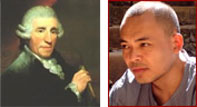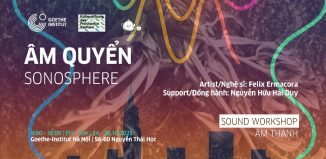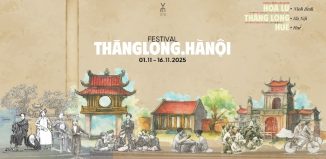KVT – Hayden Thru to Vu Nhat Tan


KVT is ever so pleased he got to see the Acies and Song Hongs in concert
The Austrians decided to celebrate their National Day and the 40th anniversary of their establishment of diplomatic relationships the Vietnamese Government with an excellent concert of chamber music at the Hanoi Opera House.
When the Austrian embassy gives us music you can bet your bonnet and button up boots that it will be top notch and so it was…yet again!
It all got off to a really good start because the Austrians decided to dispense with speeches and get straight into the swing of things with an octet of strings playing both countries’ national anthems (it’s amazing how the Vietnamese version can give me goose bumps).
Chamber music, music written for a small number of instruments, was originally designed to be played in reception rooms of grand houses and palaces to a fairly intimate audience. Its shift to concert halls is said to have started when Joseph Hayden’s compositions for four stringed instruments became so popular during his visit to London in the early 1790s that venues holding up to 800 listeners had to be found.
So it was fitting that one of the best up and coming string quartets in the world, the Austrian foursome called Acies, started off the challenging program with one of Hayden’s works specifically composed by the mid 60-year-old for a first grand public performance of quartet music in Austria ….even more fitting as Hayden is seen as the originator of the string quartet mode, written for rich patrons who wanted to have music played in their gardens and thus instruments had to be very portable and easy to shelter from sudden downpours.
You can imagine Acies forging to the forefront of the genre had they been alive in the 19th century when amateurs formed groups to play music in their own and friend’s houses, thus leading to an explosion of some great -and a lot of indifferent – chamber music compositions. Good composers would have been trying to get this youthful-looking four to play their music in public to increase sales of the sheet music……and, too, you could imagine Hayden’s great joy if he could have had such a vibrant and talented young foursome decide to play his Opus 74 no 3 for its first public outing in 1795.
It’s a magical composition and is one in which Hayden doesn’t allow the first violin to get all the best bits…except in the final galloping movement, but makes it an equal sharing between the first and second violins, the viola and the cello, making them all work demandingly flat out and coherently right from the first note of the opening movement.
Like many others, I fell in love with the slow tempo second movement, following its solemn pace and grand moments of drama. But it’s the last movement that really grabs you with its fiery trills and its other teasing stages.
Try this clip of the final movement (unfortunately not Acies) for 5 minutes of fire and ice listening
[youtube]http://www.youtube.com/watch?v=gIOaDyXcJPM[/youtube]
It was a Hayden to remember!
And here are 3 clips of the other superb movements (played by another famous string quartet, the Kodaly). The first and final movements give you a hint of why it got the rather silly nickname ‘Rider”.
[youtube]http://www.youtube.com/watch?v=EsyJQJ4oO3I&feature=BFa&list=PL48F3404D551723C6[/youtube]
[youtube]http://www.youtube.com/watch?v=EsyJQJ4oO3I&feature=BFa&list=PL48F3404D551723C6[/youtube]
[youtube]http://www.youtube.com/watch?v=5VI6wf7YgKc&feature=BFa&list=PL48F3404D551723C6[/youtube]
As I write this I’m listening to a download of an Acies’ CD which features Austrian eccentric piano player and composer Freidrich Gulda’s only string quartet. It was composed in the 1950s when Gulda was able to tear himself away from the American jazz scene and return, for a while, to end-of-the-century Viennese romanticism. This was Acies’ second offering on Friday night. Because the three movements play around with a little bit of atonal stuff a few people get a bit lost and find the work just too difficult to settle into and don’t get into the gorgeousness of it at all. But right from the dark first movement through to the end of the long and lyrical finale, the quartet had space to show us their fine technical ability and their close interdependence……a really marvelous display and a wonderful piece of music which they’ve played to great approbation in many parts of the world.
Song Hong is a Vietnamese piano quintet that has been successfully mentored by the Austrian presence in Hanoi and over the past year or two they’ve become a musical force to be reckoned with in the South East Asian chamber music sphere. On Friday they threw caution and the well known composers to the winds and they played us one of my very favorite Vietnamese sound composer’s works. And thus they showed us their versatility.
Vu Nhat Tan is a by-product of the digital age and his sound compositions are generally resonating, rebounding and often exhilarating and can be heard a couple of times a month at ATK in Hanoi. His forays into classical sound are occasionally played, the last a month ago by the Vietnam National Symphony Orchestra….really excellent it was too! Song Hong played Tan’s ‘Rains’ (composed from 2007 to 2012). It’s an experimental tone poem that requires intense concentration by the 5 players and the end result was edge of your seat listening.
Tan likes to get his strings into a frenzy of prolonged pizzicato and this somehow added to the Vietnamese feel of the work. The aural effect of the string plucking was to bring to mind a real and dripping monsoonal rain storm…a bit like the one we got all Sunday night… Great piano playing too with all its dissonance.
The four Song Hong strings joined the four Acies to round off a night to treasure with Mendelssohn’s Octet, Opus 20 which he composed when he was 16, probably when he was in the throes of the wonders and excitements of pubertal development and which he declared 20 years later, was the favorite of all his works. This Octet is often played by two good quartets combining their talents and this Austro/Vietnamese experiment was certainly successful.
Anyone in the audience a bit non plussed by the Tan or the Gulda would have been immediately brought back into the fold by the romantic beauty in this 30-minute piece. The long opening movement pulls you into a warmhearted, youthfully exuberant, yet thoughtful space and when the famous Scherzo movement washes over you, you are totally won over. The last movement that begins with one cello playing a tune that is progressively taken up by all of the instruments individually in a canon type way (fugato, I think is the correct term) and tossed playfully around, up and down and back and forth, was total magic and the flourishing finish brought huge applause…and bouquets from children in traditional Austrian costumes.
Mendelssohn composed the octet in a brazen attempt to challenge the musical status quo – and to prove himself – and he certainly did so, with eight independent string voices all going at the same time. For eight individuals on the stage to ensure that those 8 voices come across independently loud and clear and in finely tuned conversation with each other is no mean feat and that feat was accomplished beautifully on Friday.
Here’s a YouTube bit of the whole octet….it’s too hard not to be seduced from its opening notes. The audience on Friday certainly was!
[youtube]http://www.youtube.com/watch?v=CJjOAlnWmGA&feature=related[/youtube]
Mendelssohn was born the same year Haydn died so the octet was a fitting way to end the night, and to have the best work of these two oldies but really good goodies bracketing two modern works that you had to listen to fairly intently made for a little night’s music to stir the soul…
The subtle Austrian thoughtfulness extended to the bathroom areas where sparkling, soft, white hand towels were provided.
Being a string quartet fan I’ll be in the market for Acie CDs …and I wouldn’t mind one with Song Hong playing Vu Nhat Tan.
Thanks again you extremely marvelous Austrians for giving us one of the year’s most impressive musical events and big bouquets to your sponsors.
![]()
| Kiem Van Tim is a keen observer of life in general and the Hanoi cultural scene in particular and offers some of these observations to the Grapevine. KVT insists that these observations and opinion pieces are not critical reviews. Please see our Comment Guidelines / Moderation Policy and add your thoughts in the comment field below. |














Sorry but who is KVT???
HAYDEN should be spelled HAYDN
Oh those purists!!! Hayden, Haydon, Haydn, Heydn, Heydan! What’s in a name? Any rose would smell as sweet.(Sheekspiere)
Margueritte
@ Đức Anh ,
Hi there,
There’s no need to apologize for your curiosity —
you can work it out for sure — just follow the thread carefully if you really care to know.
@ KVT
Joseph Haydn. (Full stop)
The rest is irrelevant.. including Shakspiere.
>>>correction>>> … Shakespeare… ha! ha! ha!